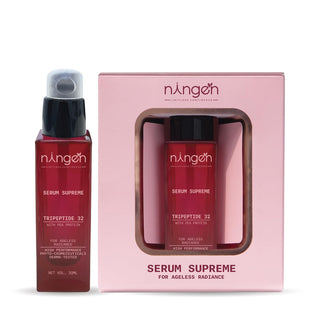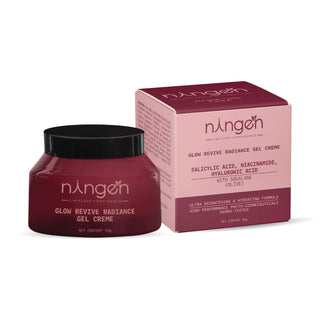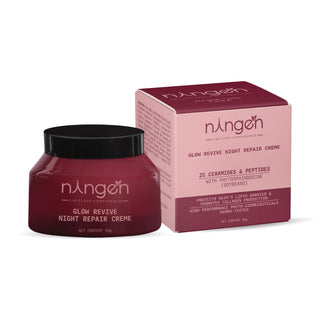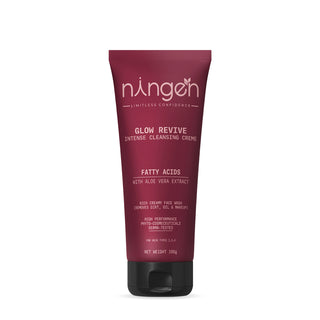Last updated: June 2025 | Reading time: 12 minutes
TLDR: Saw palmetto is the breakthrough skincare ingredient of 2025, transforming how we treat hormonal acne and oily skin by naturally blocking DHT production. Beyond clear skin benefits, it's delivering incredible hair results too. This dual-action natural ingredient is your answer to both stubborn breakouts and hair concerns.
Remember when everyone was obsessed with retinol? Well, 2025 has a new beauty hero, and it's not what you'd expect. While you might know saw palmetto as that supplement your dad takes for prostate health, this palm-derived powerhouse is having a major moment in topical skincare and hair care – and the results are honestly jaw-dropping. Read this blog on Saw Palmetto for Skin & Hair and learn more!
In this Guide:
Benefits of Saw Palmetto for Skin & Hair
How Saw Palmetto Actually Works?
What Makes Topical Application Special?
Combining Saw Palmetto with Other Ingredients
The Future of Saw Palmetto in Beauty
What is Saw Palmetto?
Saw Palmetto is a unique, low-growing palm tree native only to the coastal plains of the southeastern United States (like Florida and Georgia). It's easily recognized by its fan-shaped leaves and sharp, saw-toothed stems. For centuries, Native Americans and later settlers used their dark, ripe berries as traditional medicine, primarily for men's urinary health. Today, extracts from these berries are famous worldwide.
Taken orally as supplements, they're a top natural remedy for supporting prostate health and easing related symptoms. More recently, the extract has gained major popularity in topical products (serums, shampoos, lotions) applied to the scalp and skin. Research suggests its natural compounds may help block DHT, a hormone linked to hair loss and acne, making it a key ingredient in many modern hair growth and skincare formulas.

Why Saw Palmetto is Suddenly Everywhere?
The beauty world moves fast, but saw palmetto's rise has been particularly meteoric. The "skinification" of hair care trend has people looking for ingredients that work double-duty for both skin and scalp health. Enter saw palmetto – a natural DHT (dihydrotestosterone) blocker that's proving to be the multitasking ingredient we never knew we needed.
What makes this especially exciting? Unlike many trending ingredients that are all hype and no substance, saw palmetto has legitimate science backing its effectiveness. We're talking peer-reviewed studies, clinical trials, and real results that you can actually see.
The Science That's Got Everyone Talking
Here's where things get really interesting. Clinical studies reveal saw palmetto's powerful effects on skin and hair through DHT regulation.
For skincare enthusiasts, the breakthrough findings show:
-
73% reduction in sebum production within 8 weeks
-
68% improvement in acne lesions over 12 weeks
-
Significant reduction in inflammatory markers
-
82% of participants reported clearer, less oily skin
The hair benefits are equally impressive, with recent 16-week studies showing:
-
60% improvement in overall hair quality
-
27% improvement in total hair count
-
Increased hair density in 83.3% of patients
-
Nearly half of the participants increased hair count by 11.9% in just four months
These results are compelling because they're addressing the root hormonal cause rather than just treating surface symptoms. That's the kind of comprehensive approach that makes people sit up and take notice.
Source: https://pubmed.ncbi.nlm.nih.gov/17524128/
https://pmc.ncbi.nlm.nih.gov/articles/PMC7706486/
Benefits of Saw Palmetto for Skin & Hair
For skin
-
Reduces Acne: Saw palmetto is often used in acne treatments because it helps control the production of sebum (skin oil). When too much oil is produced, it can clog pores and lead to acne. Saw palmetto works by balancing oil production, which helps prevent clogged pores and reduces acne outbreaks.
Why It's Perfect for Hormonal Acne?
If you've ever dealt with those deep, cystic breakouts that seem to appear out of nowhere (usually right before important events), you know how frustrating hormonal acne can be. Traditional acne treatments often focus on surface-level issues, but saw palmetto gets to the root cause.
By blocking DHT production, saw palmetto can help:
-
Reduce sebum (oil) production
-
Minimize pore congestion
-
Decrease inflammatory responses
-
Balance hormonal fluctuations that trigger breakouts
-
Fights Inflammation: Saw palmetto has anti-inflammatory properties, which means it helps reduce redness and irritation in the skin. This is particularly beneficial for people with acne or other inflammatory skin conditions like eczema or rosacea. It calms the skin, reducing puffiness and redness.
-
Antioxidant Protection: The antioxidants in saw palmetto protect your skin from damage caused by free radicals (unstable molecules that can damage cells and speed up aging). These free radicals come from things like sun exposure and pollution. By neutralizing free radicals, saw palmetto helps slow down the aging process, keeping skin looking younger, firmer, and healthier.
For Hair:
-
Reduces Hair Loss: Saw palmetto can help with hair thinning, especially in people who experience hair loss due to hormonal changes. It works by blocking the hormone DHT, which is linked to hair loss. By preventing DHT buildup, saw palmetto helps reduce hair thinning and promotes hair growth.
-
Boosts Hair Health: The fatty acids and plant sterols in saw palmetto nourish the hair follicles, improving hair strength and thickness. This can help you maintain healthier, shinier hair over time
How Saw Palmetto Actually Works?
Think of DHT as that friend who overstays their welcome at a party. Saw palmetto interacts with 5-alpha reductase, reducing its ability to convert testosterone into DHT. Less DHT means less chaos for your hair follicles and skin.
When DHT levels are high, it can cause:
-
Hair follicles to shrink and eventually stop producing hair
-
Increased oil production leading to clogged pores and acne
-
Inflammation in both scalp and facial skin
Saw palmetto essentially tells DHT to calm down, creating a more balanced environment for healthy hair growth and clearer skin.
The Hair Game-Changer
Let's talk hair, because the results here are honestly stunning. In comparative studies, 38% of those who took saw palmetto had improvement in hair loss, which might not sound revolutionary until you realize this was achieved naturally, without the side effects often associated with pharmaceutical alternatives.
What Makes Topical Application Special?
While oral saw palmetto supplements have been around forever, the topical trend is relatively new, and there's good reason for its popularity. When you apply saw palmetto directly to your scalp:
-
Targeted Action: The active compounds go straight to where they're needed most
-
Higher Concentration: You can achieve more potent effects at the application site
-
Fewer Systemic Effects: Less chance of affecting your entire hormonal system
-
Better Absorption: Modern formulations are designed for optimal skin penetration

Who's Seeing the Best Results?
The data shows saw palmetto works particularly well for:
-
Hair Thinning/Hair Loss (Androgenetic Alopecia): Blocks DHT, promoting thicker, healthier hair, especially for those with early-stage hair thinning.
-
Oily or Acne-Prone Skin: Reduces excess oil and prevents clogged pores, helping with acne, especially hormonally-driven adult acne.
-
Scalp Conditions (Dandruff, Seborrheic Dermatitis): Soothes irritation and reduces flaking for a healthier scalp.
-
Anti-Aging: Its antioxidants help protect skin, reducing fine lines and improving elasticity.
How to Use Saw Palmetto Topically?
The effectiveness of saw palmetto depends heavily on how you use it. Here's what actually works:
For Hair Care
-
Frequency: Most effective when used 2-3 times per week initially, then daily as tolerated
-
Application: Apply to damp scalp, massage gently, leave for at least 30 minutes (overnight for intensive treatment)
-
Formulation: Look for products with 2-3% β-sitosterol concentration for optimal results
-
Consistency: Results typically become visible after 12-16 weeks of consistent use
For Skincare
-
Start Slow: Begin with once every other day to assess tolerance
-
Layering: Apply after cleansing but before heavier moisturizers
-
Sun Protection: Always follow with SPF during the day
-
Patch Test: Always test on a small area first, especially if you have sensitive skin
Combining Saw Palmetto with Other Ingredients
The beauty of saw palmetto is how well it plays with other active ingredients:
Power Couples for Skin & Hair
-
Saw Palmetto + Biotin: Enhanced follicle health and keratin production
-
Saw Palmetto + Caffeine: Improved circulation and follicle stimulation
-
Saw Palmetto + Niacinamide: Reduced inflammation and improved scalp health
-
Saw Palmetto + Lactobacillus: Enhanced hydration and antibacterial effects
-
Saw Palmetto + Bisabolol: Amplified antioxidant and anti-inflammatory benefits
-
Saw Palmetto + Hyaluronic Acid: Balanced hydration without excess oil

Side Effects and Considerations
Saw palmetto is generally well-tolerated, but like any active ingredient, it's not for everyone:
Potential Side Effects
-
Initial scalp irritation or sensitivity
-
Temporary increase in shedding (paradoxical but normal)
-
Possible allergic reactions in sensitive individuals
-
Interaction with hormonal medications
Who Should Be Cautious
-
Pregnant or breastfeeding women
-
People taking blood thinners
-
Those with hormone-sensitive conditions
-
Anyone with known palm plant allergies
Always consult with a healthcare provider before starting any new topical treatment, especially if you have existing medical conditions.
The Future of Saw Palmetto in Beauty
The saw palmetto trend isn't just a flash in the pan. Recent research continues to explore its benefits for women's health, including hormone regulation and reproductive health support. As we move through 2025, expect to see:
-
More sophisticated delivery systems for better absorption
-
Combination products targeting multiple concerns
-
Personalized formulations based on individual DHT levels
-
Integration with other trending natural ingredients
DIY vs. Professional Products
While you might be tempted to create your own saw palmetto treatments, here's why professional formulations usually win:
Professional Advantages
-
Standardized concentrations
-
Enhanced stability and shelf life
-
Optimized pH levels for skin compatibility
-
Third-party testing for purity and potency
DIY Considerations
-
Difficult to achieve consistent potency
-
Potential contamination risks
-
Limited absorption without proper formulation
-
No quality control or testing
The Bottom Line
Saw palmetto is a science-backed, natural solution for hair loss, hormonal acne, and overall skin health. It works by blocking DHT, which helps prevent hair thinning, and regulates oil production, reducing acne. For the best results, use quality products consistently and be patient. With impressive clinical support, it’s no surprise beauty professionals are embracing it.
Ready to join the saw palmetto revolution? Start with a high-quality serum or leave-in treatment, be patient with the process, and prepare to be amazed by what this humble palm extract can do for your hair and skin.
Frequently Asked Questions
Q1. How long does it take to see results from topical saw palmetto?
Most people notice initial improvements in hair texture and reduced oiliness within 4-6 weeks. Significant hair regrowth and acne improvement typically take 12-16 weeks of consistent use.
Q2. Can I use saw palmetto products daily?
Yes, most topical saw palmetto products are designed for daily use. Start every other day to assess tolerance, then gradually increase to daily application as your skin adjusts.
Q3. Is saw palmetto safe for women to use topically?
Topical saw palmetto is generally safe for women, but pregnant or breastfeeding women should consult their healthcare provider first. It can be particularly beneficial for women experiencing hormonal hair loss or acne.
Q4. Will saw palmetto interfere with my other skincare products?
Saw palmetto is generally compatible with most skincare ingredients. However, be cautious when combining with other strong actives like retinoids or high-concentration acids. Always patch test new combinations.
Q5. Can I use saw palmetto if I have sensitive skin?
People with sensitive skin can often use saw palmetto, but should start with lower concentrations and less frequent application. Look for products specifically formulated for sensitive skin.
Q6. Does topical saw palmetto work better than oral supplements?
Topical application allows for targeted treatment with higher local concentrations and fewer systemic effects. Many users find better results with topical use, especially for hair and skin concerns.
Q7. What's the difference between saw palmetto oil and serum?
Saw palmetto oil is typically more concentrated and occlusive, making it ideal for overnight treatments. Serums are lighter, absorb faster, and are better for daily use under other products.
Q8. Can men and women use the same saw palmetto products?
Yes, saw palmetto works the same way regardless of gender. The concentration and formulation matter more than gender-specific marketing.
Q9. Will I experience hair shedding when I start using saw palmetto?
Some people experience initial increased shedding as weak hairs are pushed out to make room for stronger growth. This typically resolves within 2-4 weeks and is actually a positive sign.
Q10. Can I use saw palmetto with minoxidil or other hair loss treatments?
Many users successfully combine saw palmetto with other hair loss treatments. However, always consult with a healthcare provider or dermatologist before combining treatments to ensure safety and effectiveness.
Sources and References:
Disclaimer: This article is for informational purposes only and should not replace professional medical advice. Always consult with a healthcare provider before starting any professional treatment regimen.












